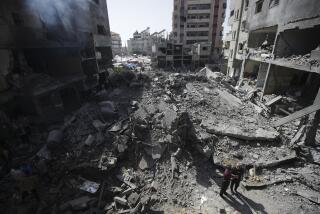Heat on Bosnia War Criminals
The Serbs made the name Bosnia reek with infamy and thought they could get away with it. They introduced the cruel phrase “ethnic cleansing” into the European vocabulary. Their military actions drove Muslims and Croats from towns in the eastern half of the country, killing thousands in a genocide unseen since the Nazis. Serbian big guns turned Sarajevo, the Bosnian capital, into a shooting gallery that rivaled Beirut. And when NATO air strikes against the Serbs belatedly but finally forced all Bosnian factions into an American-dictated peace, key Serbian commanders brushed off indictments by a United Nations war crimes tribunal and clung to power.
Foremost among the defiant Serbs were Radovan Karadzic, their political leader, and army commander Ratko Mladic. Despite the indictments, these two men continued to strut around Pale, the Bosnian Serb capital, and other cities of their truncated territory. This newspaper said that their crimes surely had earned them a bullet bearing their name and that many among their victims would be happy to deliver it. That still seems likely, but another path for bringing them to justice is opening. Thursday, British forces of the NATO command, operating with U.S. logistical support authorized by President Clinton, conducted raids in and near the northern town of Prijedor. The troops reported arresting one accused war criminal and killing another, a former Prijedor police chief, when he fired at the soldiers.
The pressure these raids put on men like Karadzic and Mladic is considerable. The Bosnian Serbs know they can no longer draw much succor from their cousins in the former Yugoslavia. They stand alone, and nothing would help them more than to cough up their two wartime leaders to U.N. authorities. Thursday’s raids should make clear that this is no longer a waiting game.
Yes, the action raises the threat of Serbian retaliation against the international military force, something that Washington considered long and hard before agreeing to direct action. But the NATO command has the capability of a devastating response if that occurs.
Yes, the raids may damage the political standing of Bosnian Serb President Biljana Plavsic, an opponent of the hard-liners, but she can read the message: Reject extremism.
Seventy-four Serbs, Muslims and Croats have been indicted by the war crimes tribunal. Only a handful are in custody. The others should start losing sleep.
More to Read
Sign up for Essential California
The most important California stories and recommendations in your inbox every morning.
You may occasionally receive promotional content from the Los Angeles Times.










